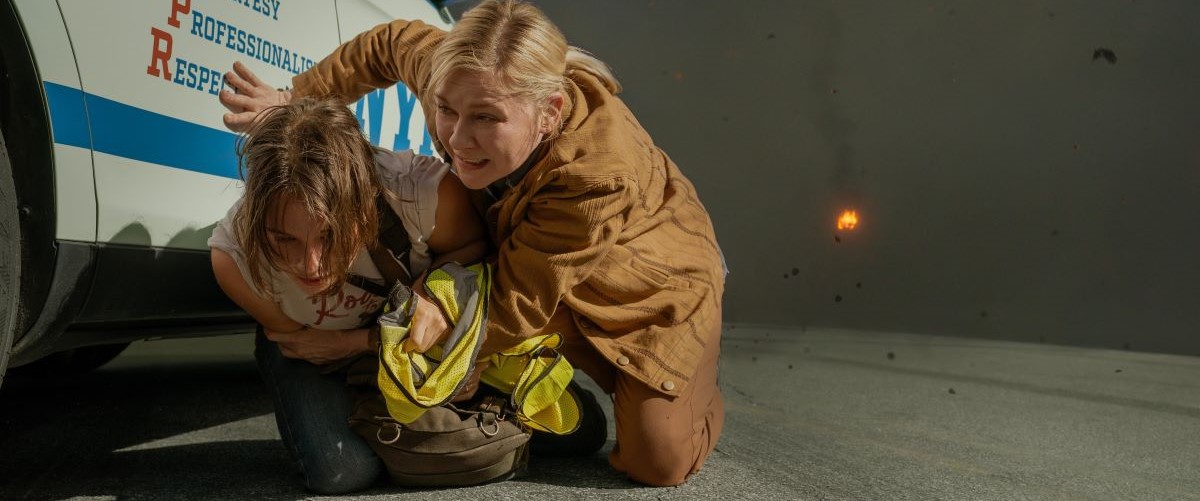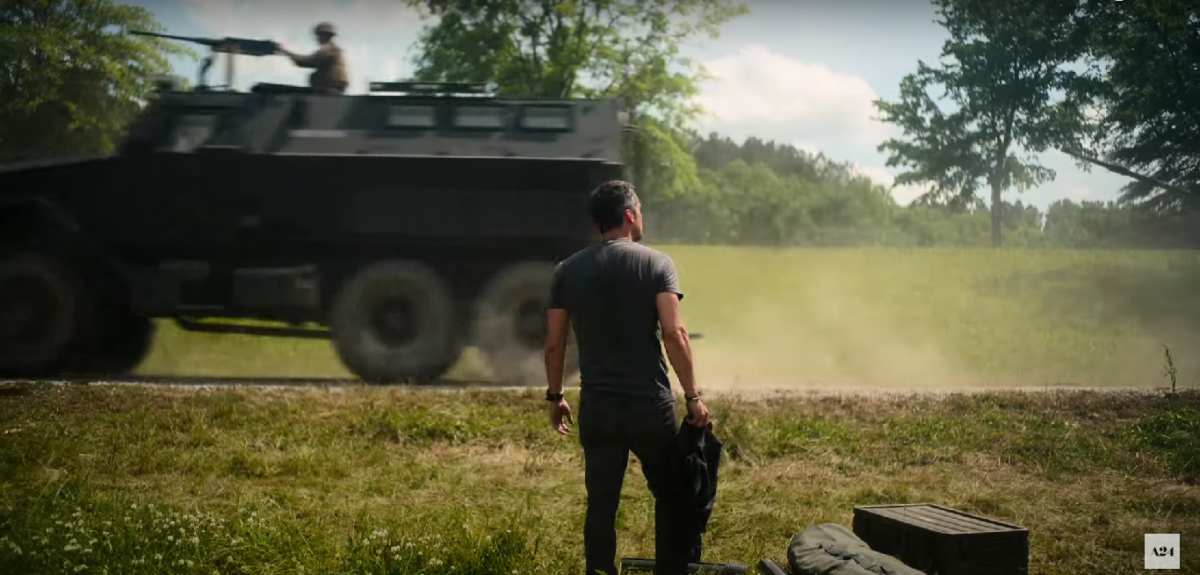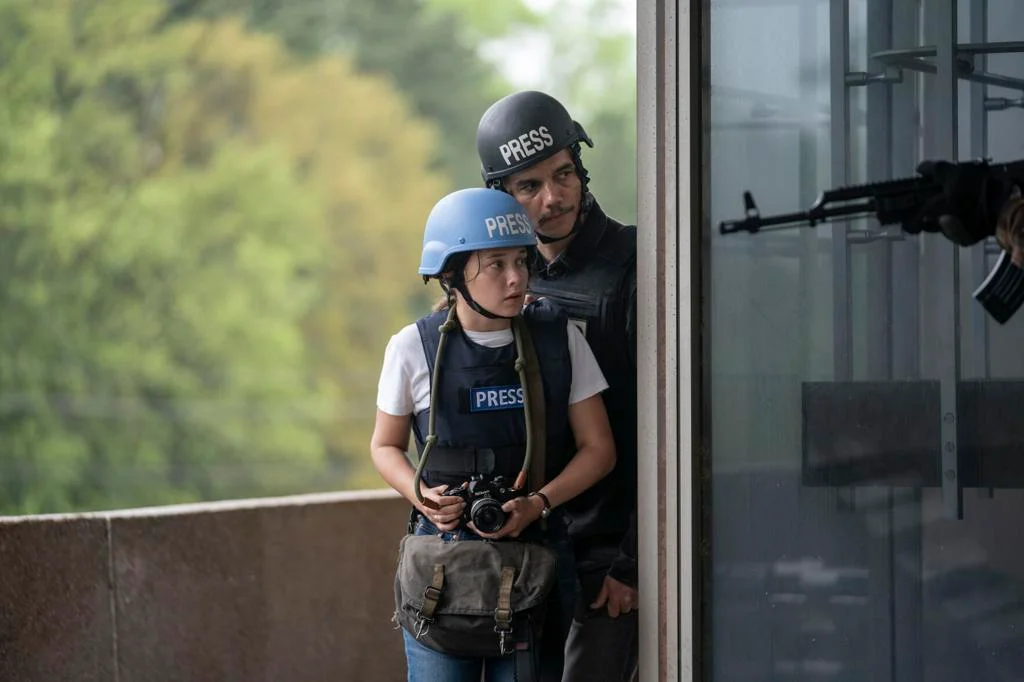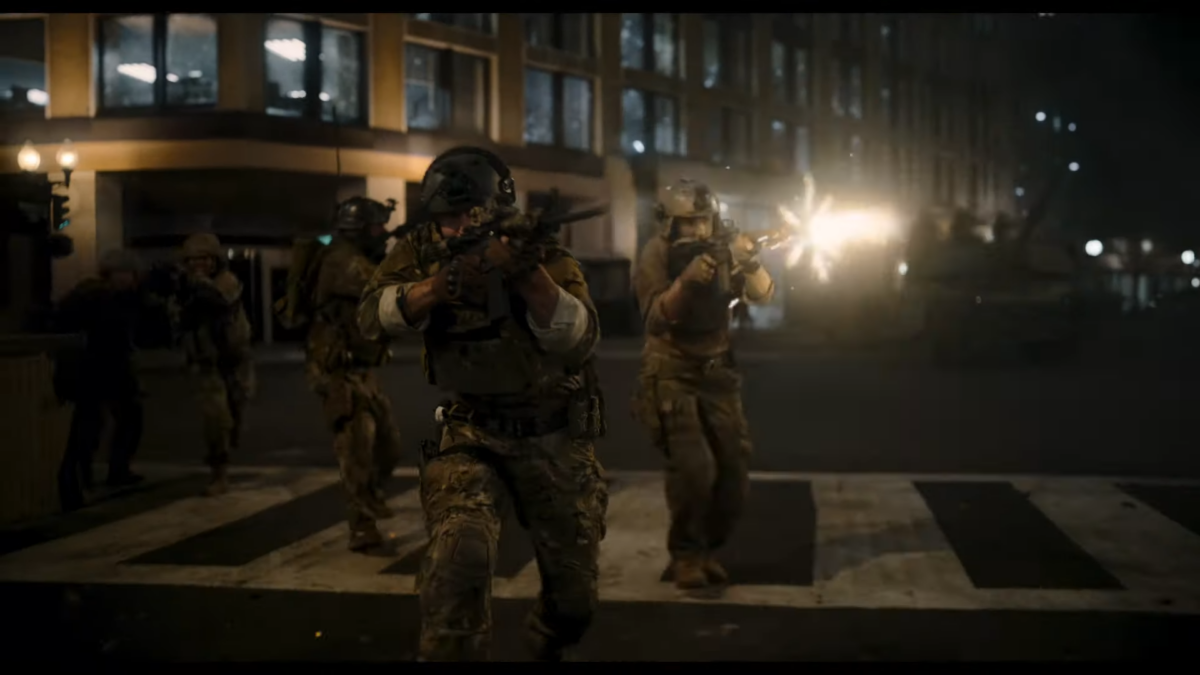Throwing us into a broken America, ravaged by a horrifying second civil war, Alex Garland’s new dystopian film Civil War confronts one of art’s seminal questions: does art mirror life, or life mirror art? The nightmarish scenario forces us to confront whether this is a terrifying glimpse into our future, or a stark reflection of the societal divisions that fracture us now?
This is not a film with cheap political answers, it is not a work of banal didacticism; Garland leaves the whys and hows up to the viewer. It echoes Garland’s recurring ambiguity, also present in Ex Machina and Annihilation where he similarly raises existential questions, inviting viewers to find their own answers within the unsettling narratives.
Kirsten Dunst drives the story as a jaded, famous photojournalist. Her character promises a dark exploration of truth and disillusionment. Her cynicism may reflect the horrors she has witnessed, raising questions about how bearing witness to conflict shapes one’s worldview. Wagner Moura plays another journalist, a seasoned companion to Dunst’s character. Journalism is central because Garland is focussed on the construction of truth, on truth as something that must be produced in the world.

Because truth is made, not arbitrarily constructed but constructed nonetheless, it is never simply readymade. Consequently, these journalists goals diverge. While Dunst captures the brutal reality of war, Moura chases the ultimate scoop: the last interview with the US president, hinting at a potential conflict between artistic truth and sensationalism. The conditions in which the media represents the world matters.
Garland encourages viewers to construct their interpretations, too, based on subtle, scattered clues. One lies in the looming character of the US president. His likeness to Trump, particularly his apparent third term in office, suggests a fracturing of the political norms in the United States leading to the Texas-California secession. The war, then, is a crucible to examine disillusionment, ambition, and the power of individual perspectives in shaping our understanding of conflict.
Another hint is from Sammi, a seasoned political writer played by Stephen McKinley Henderson. When he hears the president’s voice on the radio, he disgustedly shuts it off, muttering about “that shit” and how “the words might as well be random.” This scene can be interpreted as a direct jab at Trump’s inflammatory rhetoric, but also the refusal to comprehend a world of such monsters. The film serves as a thought experiment, allowing us to explore the consequences of a deeply polarised nation and reality and the role of the media in such a climate.

Further underscoring this focus, Garland has shot the film in a documentary style, and the music is used jarringly; the result is reminiscent of the unsettling intensity in the works of Darren Aronofsky. As we never discover the why, from either the main characters or supporting cast, the result constitutes a series of fractured vignettes, leaving us with a lingering mystery and a desire to piece the fragments on our own.
The film portrays a society in the aftermath of a major, unspecified conflict. Clues like the use/value of Canadian dollars, a refugee camp overflowing with displaced people, and the jarring sight of a clothing boutique open for business (“we tend to keep out of these things,” says the woman behind the counter) point to a drastic shift in power. While the setting has a distinct Americana aesthetic, this societal collapse, with its looters, suicide bombers, and war crimes, could erupt anywhere in a world of creeping fascism.

Cailee Spaeny, another photojournalist, but young and full of ambition, manages to tag a ride with the experienced reporters. Dunst reluctantly takes Spaeny under her wing. Spaeny’s naive enthusiasm contrasts with Dunst’s worldweary cynicism. While Dunst’s character is fleshed out by flashbacks, the other main characters remains a blank canvases, forcing the narrative spotlight squarely onto Dunst and her complex inner world.

While it interrogates journalism, Civil War also champions it, painting journalists as a whole as flawed but courageous. In a world saturated with AI deception and manipulated imagery, Garland depicts the sacrifices journalists make to fight for accuracy, to be faithful witnesses. Without dipping into moralism, there is an attempt here to address the self-image of the media.
The film’s conclusion at the White House feels trapped and desperate: Hitler in his bunker? Perhaps a bolder choice by Garland would have been to set it in a more contemporary location, Mar-a-Lago, maybe? Perhaps it is caught by its own commitment to ambiguity, meaning that Civil War struggles to offer a satisfying resolution to the problems it poses. Instead, it opts for the obvious tropes. But despite this predictable ending, the movie offers enough intrigue to warrant a watch and further engagement.
Civil War is in UK cinema’s from today. (12/04)
Art (55) Book Review (127) Books (114) Capitalism (68) China (81) Climate Emergency (99) Conservative Government (90) Conservative Party (45) COVID-19 (46) EcoSocialism (60) Elections (83) Europe (46) Fascism (63) Film (48) Film Review (69) France (72) Gaza (63) Imperialism (101) Israel (130) Italy (46) Keir Starmer (56) Labour Party (115) Long Read (42) Marxism (49) Marxist Theory (47) Palestine (185) pandemic (78) Protest (154) Russia (343) Solidarity (152) Statement (50) Trade Unionism (144) Ukraine (351) United States of America (140) War (371)


Great review.
Garland is an interesting and challenging writer – going back to is first novels The Beach (the film wasn’t great) and The Tesseract (which I loved). It matters that films and fiction interrogate reality and explore alternative narratives rather than simply provide didactic solutions. There’s a deeply ingrained tendency on the left to see culture as a vehicle for propaganda rather than as something much more inquisitive and compelling. Ta. Wanna watch this ….